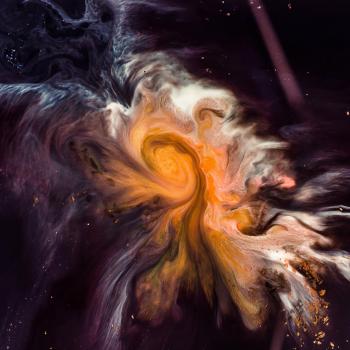On the goodness and beauty of this world I can hardly keep still. I fidget with excitement. To see another mountain range. To discover a new path. To stand on the side of a remote gorge and listen to utter silence. To discover a three foot icicle hanging from an inordinately beautiful mound of moss.
The ice and moss and silence does not serve me. There is no immediate utilitarian purpose to it. It’s there, moving in and among its habitat whether I am there to observe or not. They are hidden glories. When I happen upon them, they move me in a direction I can only describe as Divine—toward God, my heavenly Father.
Among the rancor of popular culture, the biting rhetoric, the ego-centric writing and bloviating, the blessings of our earthly city easily go unnoticed. Moss and icicles? How simple. How plain. And yet when we remove ourselves from the pace and noise of our culture, we discover how we thirst for such simplicity.
Augustine closes the final book of his City of God with the reflection “Of the Blessings with Which the Creator Has Filled This Life, Obnoxious Though It Be to the Curse.” (Bk. XXII, Ch. XXIV) It’s worth reading aloud in a quiet place or with a loved one. Here’s part of my favorite section:
The Blessings of Beauty in the Earthly City
How can I tell of the rest of creation, with all its beauty and utility, which the divine goodness has given to man to please his eye and serve his purposes, condemned though he is, and hurled into these labors and miseries? Shall I speak of the manifold and various loveliness of sky, and earth, and sea; of the plentiful supply and wonderful qualities of the light; of sun, moon, and stars; of the shade of trees; of the colors and perfume of flowers; of the multitude of birds, all differing in plumage and in song; of the variety of animals, of which the smallest in size are often the most wonderful,—the works of ants and bees astonishing us more than the huge bodies of whales?
Shall I speak of the sea, which itself is so grand a spectacle, when it arrays itself as it were in vestures of various colors, now running through every shade of green, and again becoming purple or blue? Is it not delightful to look at it in storm, and experience the soothing complacency which it inspires, by suggesting that we ourselves are not tossed and shipwrecked?1664
What shall I say of the numberless kinds of food to alleviate hunger, and the variety of seasonings to stimulate appetite which are scattered everywhere by nature, and for which we are not indebted to the art of cookery? How many natural appliances are there for preserving and restoring health! How grateful is the alternation of day and night! how pleasant the breezes that cool the air! how abundant the supply of clothing furnished us by trees and animals! Who can enumerate all the blessings we enjoy?
If I were to attempt to detail and unfold only these few which I have indicated in the mass, such an enumeration would fill a volume. And all these are but the solace of the wretched and condemned, not the rewards of the blessed.
As a reminder, these are only a sampling of the blessings of the earthly city, this world. Even after the fall of man, God did not remove the beauty and amazing utility found in the world. He left them, one might say, as reminders or clues to his nature, intent, and love for us. Even Cicero argued (as did Jewish rabbis) that the human mind points to what God is like. (Stoic philosophers also argued that the nature of God was evident in creation.)
The Apostle Paul reminds the Christians in Rome that knowledge of God can be derived from creation:
“Ever since the creation of the world his eternal power and divine nature, invisible though they are, have been understood and seen through the things he has made. So they are without excuse; for though they knew God, they did not honor him as God or give thanks to him, but they became futile in their thinking, and their senseless minds were darkened. Claiming to be wise, they became fools; and they exchanged the glory of the immortal God for images resembling a mortal human being or birds or four-footed animals or reptiles.” (Rom. 1:20-23)
We can, as Paul states, see and understand God through his creation. This “seeing” Paul references is understood as the ability to inwardly comprehend. But even though God disclosed himself through the pervading joy and beauty of creation, it is too often not enough for us. We (humankind) become futile in our thinking, denoted by our move to each of us living as though we were another Adam/Eve, choosing self over God.
We are both the same beings who possess the ability to sense the divine as well as the will to suppress the truth communicated through the experience of God through the beauty and wonder of his creation.
So creation (nature) can only take us so far in our knowledge of God. Moo goes so far as to suggest that though we experience sensus divinitatis (a sense of the the divine), this knowledge is impure and easily perverted. When this knowledge does not lead to worship (reverence and gratitude), it quickly darkens. And so natural revelation in its limited form is insufficient to establish spiritual relational intimacy.
The invitation of Nature (natural revelation), however, remains. What do we do with it? If we accept the invitation, we then move toward relational fullness with God.
Augustine contrasts life on earth, with our insufficient knowledge of God, with the heavenly city. Augustine asks a series of questions to provoke the reader into contemplation about the indescribable blessings that await. These blessings emanate from another kind of beauty; one rooted in love.
Here Augustine continues his reflection on the blessings of the heavenly city, the city of God:
The Incomparable Blessings of the City of God
What then shall these rewards be, if such be the blessings of a condemned state? … What blessings will He in the blessed life shower upon those for whom, even in this state of misery, He has been willing that His only-begotten Son should endure such sufferings even to death?
Thus the apostle reasons concerning those who are predestined to that kingdom: “He that spared not His own Son, but delivered Him up for us all, how shall He not with Him also give us all things?”1665
When this promise is fulfilled, what shall we be? What blessings shall we receive in that kingdom, since already we have received as the pledge of them Christ’s dying? In what condition shall the spirit of man be, when it has no longer any vice at all; when it neither yields to any, nor is in bondage to any, nor has to make war against any, but is perfected, and enjoys undisturbed peace with itself?
Shall it not then know all things with certainty, and without any labor or error, when unhindered and joyfully it drinks the wisdom of God at the fountain-head?
Christ’s Atonement: Loving Pursuit & Invitation
C.S. Lewis, in his sermon “The Weight of Glory,” also suggests that even the pleasures of this world, given to us by God, will not compare to the violent torrent of joy we will experience in the heavenly city. Lewis says the whole man will one day drink from the fountain of joy, echoing Augustine’s sentiment of the incomparable richness of heavenly blessings.
But what is it that makes these blessings so complete and beautiful?
Do we forget the inexpressible wonder of the Divine gesture? The offering of God’s one-of-a-kind son, what in Christian theology is referred to as the atonement? The atonement is not popular these days. Writers like Pastor Mark Sandin (among others) object to the atonement because they don’t like that “God solves problems with violence.”
But this characterization narrows God into a human framework. God does not deal with the problem of sin because it invokes in him an emotional wrath. God’s response to sin is a “direct and steadfast opposition to all that is evil.” This is an essential response for God due to his character as totally other, Divine, sui generis.
The point of the atonement, however, rests in the act of love God showed to mankind in order to restore fellowship. Sin created a problem for humankind, and God, in his love, made provision through the profound gift of his one-of-a-kind son. Once a person enters into a relationship with God, that provision of the atonement covers us.
Even when we continue to sin (falling short of the glory of God, as Paul puts it), our peace comes from the provision of Jesus and his work on the cross. A person does not become perfect once they enter into a relationship with God through Jesus. Rather, they enter into the beautiful process of daily becoming more like him, as our earthly desires form to his heavenly desires.
On the Other Side of Heaven
As one who lives on the other side of nature’s invitation, I move through my days observing his hand in nature, and in my own life, shaping me, screening the sinful silt from the angry sinful river inside me. One day, it will flow with pure waters, straight from the fountain of Joy itself.
I take Augustine’s reflection as my own; indulging in the wonder and beauty of this earthly city, and pining for a day when utter fullness breaks in and steals the show.












